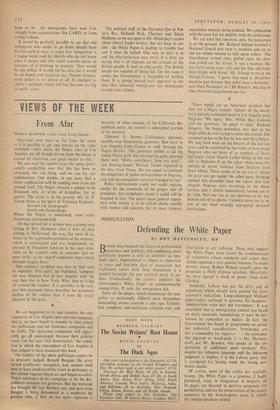VIEWS OF THE WEEK
From Afar
MURRAY KEMPTON writes from Long Island :
Everyone even here—as far from the scene as it is possible to get and remain on the same continent—talks about the Negro riots in Los Angeles, cut off though we are from the image as carried by teleVision, our great inciter to riot.
We can read the reports from the scene, parti- cularly compelling now that this has been so obviously the real thing, and we can try our explanations. One doubts, in any case, that a better explanation will be coming even from the ground itself. The Negro remains a subject to be discussed only in terms of prejudice, for or against. The point is in the precept Mr. G. F. Young chose as the spirit of Victorian England : Servants talk about people Gentle folk discuss things.
Where the Negro is concerned, most other Americans are Gentle folk.
All that served fora witness was a young man resting in East Hampton after a tour of duty writing in Hollywood. He was, like most of us, secure in the respectable prejudice of the moment, which is sociological and was handsomely ex- pressed by President Johnson in his own state- ment on the troubles with its reminder that we must strike `at the unjust conditions fr.om which disorder largely flows.'
Our witness's problem was that he had seen no injustice. 'You can't,' he explained, `compare the way Negroes live in Los Angeles with the way they live in New York. Why, they're living all around the studios.' It is possible, to be sure, that this statement better describes the economic decline of the studios than it does the social advance of the poor.
We arc beginning to try and translate the con- sequences of Los Angeles into our own language, that is, we have begun to wonder to what extent our politicians and our insurance companies will be liable. The insurance companies will appar- ently get off undamaged, because their policies cover riot but not `civil insurrection,' the condi- tion to which the atmosphere of Los Angeles is thus judged to have escalated this week.
The liability of the white politicians cannot be so precisely judged. Ronald Reagan, the actor turned Goldwater evangelist, had seemed until now to have moderated'his tastes in deference to the current vagrant liberal air and begun to solicit Negro assistance in his campaign to be the Re- publican nominee for governor. But the weekend has brought the true Birchers out, and now even Reagan is being denounced as a moderate by persons who, if they do not quite represent a majority of what remains of the California Re- publican party, do control a substantial portion of its treasury.
Edmund G. Brown, California's pleasant, worldly-wise Democratic governor, flew back to Los Angeles from Greece to walk through the Negro district. `The governor smiled at all the young Negro girls who crossed his path, greeting them with "Hello, sweetheart, how are you?", and shaking hands,' Wallace Turner reported to the New York Times. `He was asked to comment on complaints of police mistreatment of Negroes, and said the complaints were not founded in fact.'
Police mistreatment could not really explain, except by the standards of the proper sort of prejudice; but complaints about it could still be founded in fact. The poor's most general experi- ence with society is to be talked about, usually with respect and concern, but its most intimate experience remains being policed. We sympathise with the poor but we identify with the policeman.
We are kind but removed; only the policeman is on the ground. Mr. Richard Schaap watched a National Guard unit turn its machine gun on, an old car which refused to halt upon orders. `The Guardsmen rushed over, pulled open the door and pulled out the driver. It was a woman. She was forty-seven years old, and her legs and body were bright with blood,' Mr. Schaap wrote in the Herald-Tribune. 'I guess they used a .30-calibre machine gun because they didn't have a howitzer,' said Noel Parmentel of CBS Reports. But that is what National Guardsmen are for.
* These things are an American problem but they are a Negro trouble. Almost all the nearly forty persons estimated dead in Los Angeles were Negroes. 'We have,' Mrs. Willie May Colston told the governor, no place to hide.' Richard Gregory, the Negro comedian, was shot in the thigh while he was trying to calm one crowd. The assumption has to be that he was shot by a Negro. We may look back on the history of the last ten years and be surprised by the irony of how many Negroes who we think of as symbols of black militancy—from Martin Luther King on the one side to Malcolm X on the other—have been the victims of worse violence from Negroes than from whites. There seems to be no one at whom the poor can get except the other poor. Nothing seemed less plausible than the report that Los Angeles Negroes were marching on the white section, and it almost immediately turned out to be false. Not one riot in our ghettoes so far has broken out of its ghetto. Violence turns out to be one of our most strongly segregated national institutions.






























 Previous page
Previous page